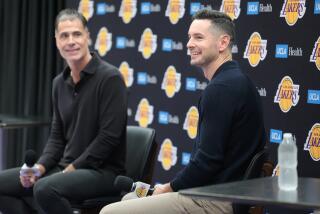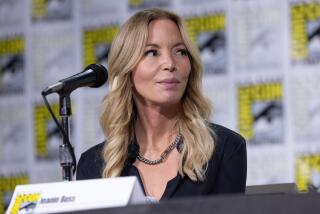Fourward March
- Share via
Well, at least no one can say they’re just hype any more.
Nor are the Lakers the greatest team of all time. By normal standards, winning three titles in a row is impressive but if you’re talking about dynasties, it’s merely entry level.
While we’re attempting to place the Lakers in history, we should note that newspaper stories don’t decide this. History does, and it isn’t over.
Of course, only three other NBA teams won three in a row (Minneapolis Lakers, 1952-54; Boston Celtics, 1958-66; Chicago Bulls, 1991-93 and 1996-98) and the Lakers may not be through. Shaquille O’Neal is 30, Kobe Bryant is 23 and Phil Jackson is coming back.
These guys expect to take this further. They barely even bother to celebrate any more.
Remember O’Neal running madly up the floor with his arms extended and his eyes bugging out after dunking that lob from Bryant to beat the Portland Trail Blazers in Game 7 of the 2000 Western Conference finals?
That’s all over. Now they congratulate one another on a job well done, as in Wednesday night’s subdued reaction when O’Neal rubbed the top of Mitch Richmond’s head and later told ESPN’s Stuart Scott: “It’s still not enough for me.”
What they have done to this point is nominate themselves for greatness. Having separated themselves from the pack, they now have to show they can separate themselves from the company of the other great teams.
Of course, since they were just hype as recently as the 1999 playoffs, this is remarkable progress.
From the moment O’Neal arrived in the summer of 1996, everyone assumed they would take over the league. Every game story that ran in this newspaper that season was accompanied by a box comparing them to the Lakers’ greatest teams.
That team, however, was a tad confused about certain key questions, such as: Who’s in charge here?
O’Neal had just come from Orlando, where the Magic had spent four seasons building a team around him, with the requisite star perimeter player in the young Penny Hardaway and a bunch of shooters.
The Lakers, on the other hand, had a polyglot bunch of players whom Jerry West had gathered by hook and crook. Some, such as Nick Van Exel and Cedric Ceballos, were available only because they were hard to deal with. Then there was the 17-year-old Bryant, fresh out of Lower Merion High. Clueless as he was, he wasn’t merely their mascot. He was in the rotation and an instant fan favorite, to boot.
In O’Neal’s first Laker season, the Utah Jazz took them out in the second round, 4-1. The series ended with Bryant throwing up four airballs at the end of Game 5, a harbinger of things to come.
Nor would they win the next season, when the Jazz took them out in the West finals, 4-0, after the Lakers did their usual number, proclaiming themselves the more talented team.
This, of course, was an object lesson for them of how much talent counted.
“I looked at what was on paper and I couldn’t understand it,” said Rick Fox last week.
“I thought we were the most talented team in the league. I thought we had a chance to do some great things. But our heads were in different places. Our ability to work together was nonexistent. We were disjointed. We had no understanding of what it meant to play at a championship level.... It’s nice to have that talent, but it doesn’t also win you championships if you can’t work together.”
On the other hand, the worst was yet to come.
Frustrated in their search for a power forward to complement O’Neal (as Horace Grant had in Orlando), they brought in Dennis Rodman for their Ultimate Meltdown in 1999, culminating in another 4-0 exit, this one in the second round at the hands of the San Antonio Spurs. Del Harris had been fired early in the season and West, aghast at what was going on but unwilling to confront the owner’s favorite, all but disappeared for months.
Forget dominating. The Lakers weren’t even getting better.
Oh, and Bryant had just become a starter and he and O’Neal weren’t getting along.
A lot has changed in the ensuing three years.
Whatever this becomes, six men will have played huge roles in making it happen:
* Jerry Buss. More detached than he had been in the Showtime years, he nevertheless had one great moment in the summer of 1996, when O’Neal, who had just built a huge home in Orlando and moved his family to town, turned down a Laker offer of $97 million. With West worrying it was time to go to Plan B--signing free agents Dikembe Mutombo and Dale Davis--Buss told him to go for broke. So West gave Anthony Peeler and George Lynch to Vancouver, freeing up $20 million more to offer O’Neal. Orlando matched the offer, noting that with no state income tax and more money up front, their bid was worth more. O’Neal, who didn’t feel like making subtle distinctions, felt insulted and signed with the Lakers.
* West. He did an incredible rebuilding job after Magic Johnson’s sudden retirement in 1991 dropped the curtain on Showtime. With the rest of the old nucleus (James Worthy, Byron Scott, A.C. Green) on its way out, West drafted Van Exel and Eddie Jones, stole Ceballos from the Suns, got them all signed long-term and still kept his payroll low, giving the Lakers the cap room to pursue O’Neal. Meanwhile, they missed the playoffs only once.
* Harris. Fired in the turbulent 1999 lockout-shortened season, he never gets the credit due him. They were a disorganized 33-49 team when he arrived in 1994. He organized them into a team that went 48-34, then 53-29. Had the Lakers remained a bad team, O’Neal wouldn’t have come.
* O’Neal. Despite his childlike fondness for expensive toys and super-heroes and off-season forays into rapping and acting, he always tried to do whatever it took to win. He took a lot of flak for his early-career disappointments, causing him to go off on anyone he thought was letting the side--and him--down. His complaints about Van Exel’s joke about going to Cancun, when they trailed Utah, 3-0, in 1998, led to Nick’s exile to Denver. Likewise, a Shaq recommendation led to the surprise hiring of Jackson in 1999 when they were about to rehire interim coach Kurt Rambis. Since then, with Jackson zinging O’Neal, often more than Shaq likes, he has gone to a level all his own.
* Bryant. If Shaq was their man-child, Kobe was their child-man, but he had problems- too. It took four years to break down the distance between this self-contained young man and his teammates and to get him to play with them, rather than ignore them. After a particularly turbulent 2000-2001 season, in which Kobe found himself at an impasse with both Jackson and O’Neal, he suddenly got with the program last spring. The program hasn’t been the same since.
* Jackson. The final piece of the puzzle, he organized a bunch of kids into a hard-working, professional team, throwing such talented young players as Ruben Patterson over the side because he thought they’d be hard to work with, bringing in used-up-looking old pros like Ron Harper and Brian Shaw. Most important, Jackson got on top of both O’Neal and Bryant, something none of their coaches had been able to do.
The rest is, or will be, history.
More to Read
All things Lakers, all the time.
Get all the Lakers news you need in Dan Woike's weekly newsletter.
You may occasionally receive promotional content from the Los Angeles Times.






